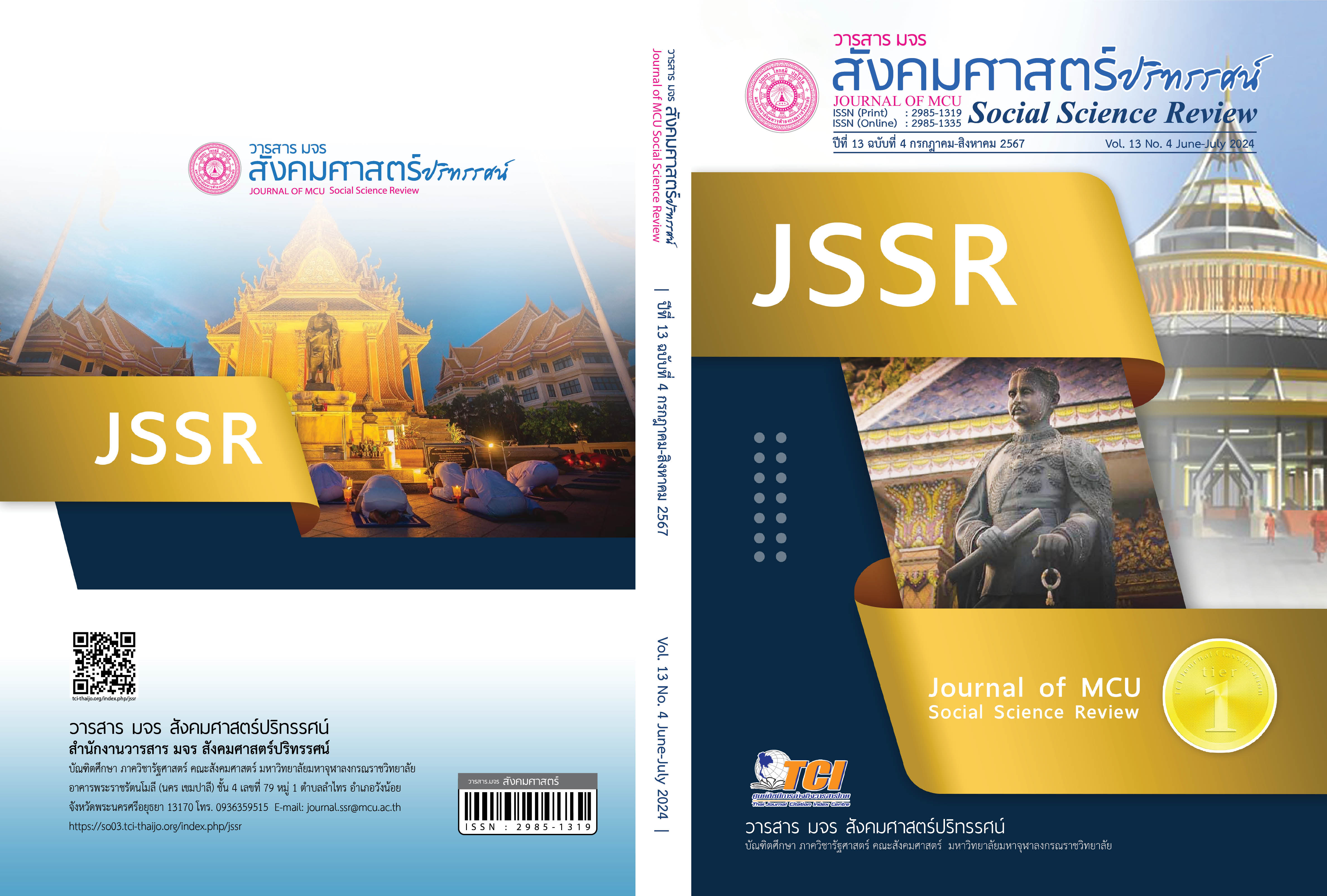การพัฒนามาตรวัดสมรรถนะล้มแล้วลุกเร็วสำหรับนักทรัพยากรมนุษย์ของบริษัทเอกชนในประเทศไทย
คำสำคัญ:
ล้มแล้วลุกเร็ว, มาตรวัดล้มแล้วลุกเร็ว, นักทรัพยากรมนุษย์บทคัดย่อ
บทความวิจัยนี้มีวัตถุประสงค์ 1. สังเคราะห์องค์ประกอบของสมรรถนะล้มแล้วลุกเร็ว 2. พัฒนามาตรวัดสมรรถนะล้มแล้วลุกเร็วสำหรับนักทรัพยากรมนุษย์ของบริษัทเอกชนในประเทศไทย 3. ประเมินคุณภาพของมาตรวัดสมรรถนะล้มแล้วลุกเร็วสำหรับนักทรัพยากรมนุษย์ของบริษัทเอกชนในประเทศไทยที่ได้พัฒนาขึ้น มีวิธีการวิจัย 3 ขั้นตอน ดังนี้ 1. สังเคราะห์องค์ประกอบของสมรรถนะล้มแล้วลุกเร็ว โดยทำการวิจัยเชิงคุณภาพสัมภาษณ์เชิงลึก โดยใช้แบบสัมภาษณ์แบบกึ่งโครงสร้าง มีผู้ให้ข้อมูลสำคัญ จำนวน 9 คน 2. ร่างคำถามของมาตรวัดภายใต้แต่ละองค์ประกอบเพื่อจัดทำมาตรวัดเบื้องต้น และผู้ทรงคุณวุฒิ จำนวน 5 คน ตรวจสอบคุณภาพของมาตรวัด โดยใช้ค่าการวิเคราะห์ดัชนีความสอดคล้อง (IOC) 3. ประเมินคุณภาพของมาตรวัด โดยใช้ค่าการวิเคราะห์ดัชนีวัดความเที่ยงตรงเชิงเนื้อหา (I-CVI) และทดสอบกลุ่มตัวอย่าง จำนวน 30 คน
ผลการวิจัยพบว่า 1. สมรรถนะล้มแล้วลุกเร็ว มีองค์ประกอบ 6 องค์ประกอบ ได้แก่ มองภาพใหญ่ ปรับตัวเก่ง มีสติ ดีกว่าเดิม มองโลกบวก และ ไม่ยอมแพ้ 2. ได้มาตรวัดที่มีข้อคำถามสอดคล้องกับองค์ประกอบ ทั้งหมด 35 ข้อคำถามซึ่งสามารถสะท้อนถึงระดับของสมรรถนะล้มแล้วลุกเร็ว และ 3. คำถามภายใต้มาตรวัด จำนวน 35 ข้อ ผ่านเกณฑ์ที่ยอมรับได้ที่ 0.80 และมาตรวัดสำหรับนักทรัพยากรมนุษย์ของบริษัทเอกชนในประเทศไทยนี้ เป็นมาตรวัดที่มีการใช้ภาษาที่เข้าใจง่าย สามารถนำผลลัพธ์ที่ได้ไปแปลผลในรูปแบบกราฟ
เอกสารอ้างอิง
กัญกร คำพรรณ และสิริวัฒน์ ศรีเครือดง. (2564). พุทธจิตวิทยาการฟื้นฟูพลังจิตใจผู้ผิดหวังในความรัก. วารสาร มจร มนุษย์ศาสตร์ปริทรรศน์, 7(2), 289-307.
กองยุทธศาสตร์และแผนงาน กรมสุขภาพจิต. (2563). แผนการฟื้นฟูจิตใจในสถานการณ์การระบาดของโรคติดเชื้อไวรัสโคโรนา 2019 (COVID-19) (Combat 4th Wave of COVID-19 Plan: C4) (ฉบับปรับปรุง). นนทบุรี: กรมสุขภาพจิต.
พิศิษฐ์ ตัณฑวณิช และพนา จินดาศรี. (2561). ความหมายที่แท้จริงของค่า IOC. วารสารคณะศึกษาศาสตร์ มหาวิทยาลัยมหาสารคาม, 24(2), 3-12.
ศุภรา เชาว์ปรีชา. (2551). ปัญหาจิตเวชเด็กและวัยรุ่นที่พบบ่อยในคลินิกตรวจผู้ป่วยนอกโรคทั่วไป แผนกกุมารเวชกรรม โรงพยาบาลธรรมศาสตร์เฉลิมพระเกียรติ. วารสารสมาคมจิตแพทย์แห่งประเทศไทย, 52(1). 8-18.
สุจิตรา เทียนสวัสดิ์. (2552). ดัชนีความตรงเชิงเนื้อหา: ข้อวิพากษ์และข้อเสอแนะวิธีการคำนวณ, พยาบาลสาร, 24(4). 1-9.
สุชาติ ประสิทธิ์รัฐสินธุ์. (2537). การสร้างมาตรวัดในการวิจัยทางสังคมศาสตร์และพฤติกรรมศาสตร์ (พิมพ์ครั้งที่ 2). กรุงเทพฯ: สถาบันบัณฑิตพัฒนบริหารศาสตร์.
Aknin, L. B. et al. (2022). Mental Health During the First Year of the COVID-19 Pandemic: A Review and Recommendations for Moving Forward. Perspectives on Psychological Science, 17(4), 915-936.
Breazeale, R. (2021). Duct Tape Isn't Enough: Survival Skills for the 21st Century. Retrieved November 30, 2020, from https://shorturl.asia/bGAIK
Cullins, A. (2021). 9 Activities To Build Grit and Resilience in Children. Retrieved December 30, 2021, from https://shorturl.asia/6afoT
Jacobs, T. (2015). Evidence Mounts That Mindfulness Breeds Resilience. Retrieved November 25, 2021, from https://shorturl.asia/ujVbi
Netemeyer, R. G. et al. (2003). Scaling procedures: Issues and applications. Statistics in Medicine, 23(15), 2480-2481.
Oliver, K. G. et al. (2006). Building resilience in young people through meaningful participation. Australian e-Journal for the Advancement of Mental Health, 5(1), 34-40.
Washington State Department of Health. (2020). Covid-19 Guidance for Building Resilience in the Workplace. Retrieved September 11, 2020, form https://shorturl.asia/RGZNj
World economic forum. (2015). Deep Shift-Technology Tipping Points and Societal Impact. Retrieved December 11, 2021, form https://shorturl.asia/Z9uV3
ดาวน์โหลด
เผยแพร่แล้ว
รูปแบบการอ้างอิง
ฉบับ
ประเภทบทความ
สัญญาอนุญาต
ลิขสิทธิ์ (c) 2024 วารสาร มจร สังคมศาสตร์ปริทรรศน์

อนุญาตภายใต้เงื่อนไข Creative Commons Attribution-NonCommercial-NoDerivatives 4.0 International License.
เพื่อให้เป็นไปตามกฎหมายลิขสิทธิ์ ผู้นิพนธ์ทุกท่านต้องลงลายมือชื่อในแบบฟอร์มใบมอบลิขสิทธิ์บทความให้แก่วารสารฯ พร้อมกับบทความต้นฉบับที่ได้แก้ไขครั้งสุดท้าย นอกจากนี้ ผู้นิพนธ์ทุกท่านต้องยืนยันว่าบทความต้นฉบับที่ส่งมาตีพิมพ์นั้น ได้ส่งมาตีพิมพ์เฉพาะในวารสาร มจร สังคมศาสตร์ปริทรรศน์ เพียงแห่งเดียวเท่านั้น หากมีการใช้ภาพหรือตารางหรือเนื้อหาอื่นๆ ของผู้นิพนธ์อื่นที่ปรากฏในสิ่งตีพิมพ์อื่นมาแล้ว ผู้นิพนธ์ต้องขออนุญาตเจ้าของลิขสิทธิ์ก่อน พร้อมทั้งแสดงหนังสือที่ได้รับการยินยอมต่อบรรณาธิการ ก่อนที่บทความจะได้รับการตีพิมพ์ หากไม่เป็นไปตามข้อกำหนดเบื้องต้น ทางวารสารจะถอดบทความของท่านออกโดยไม่มีข้อยกเว้นใดๆ ทั้งสิ้น





